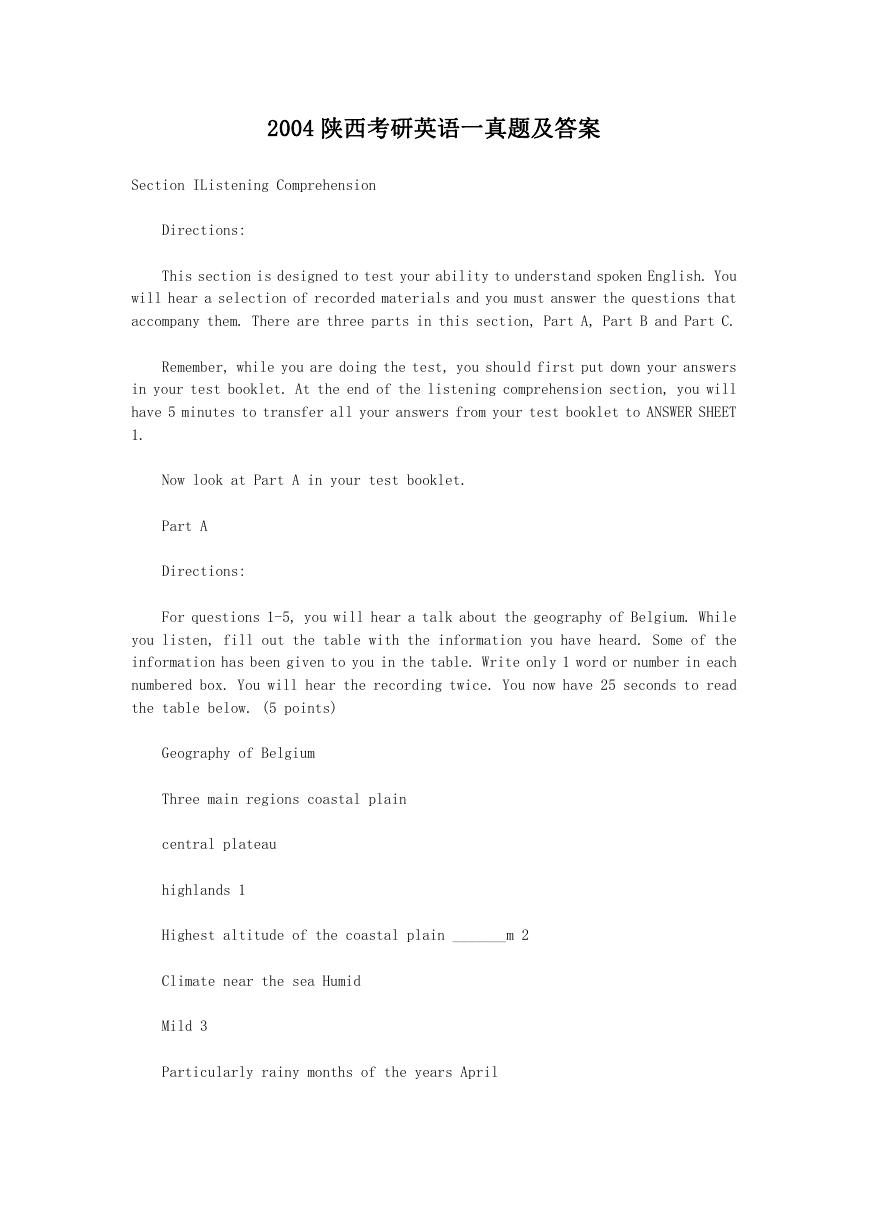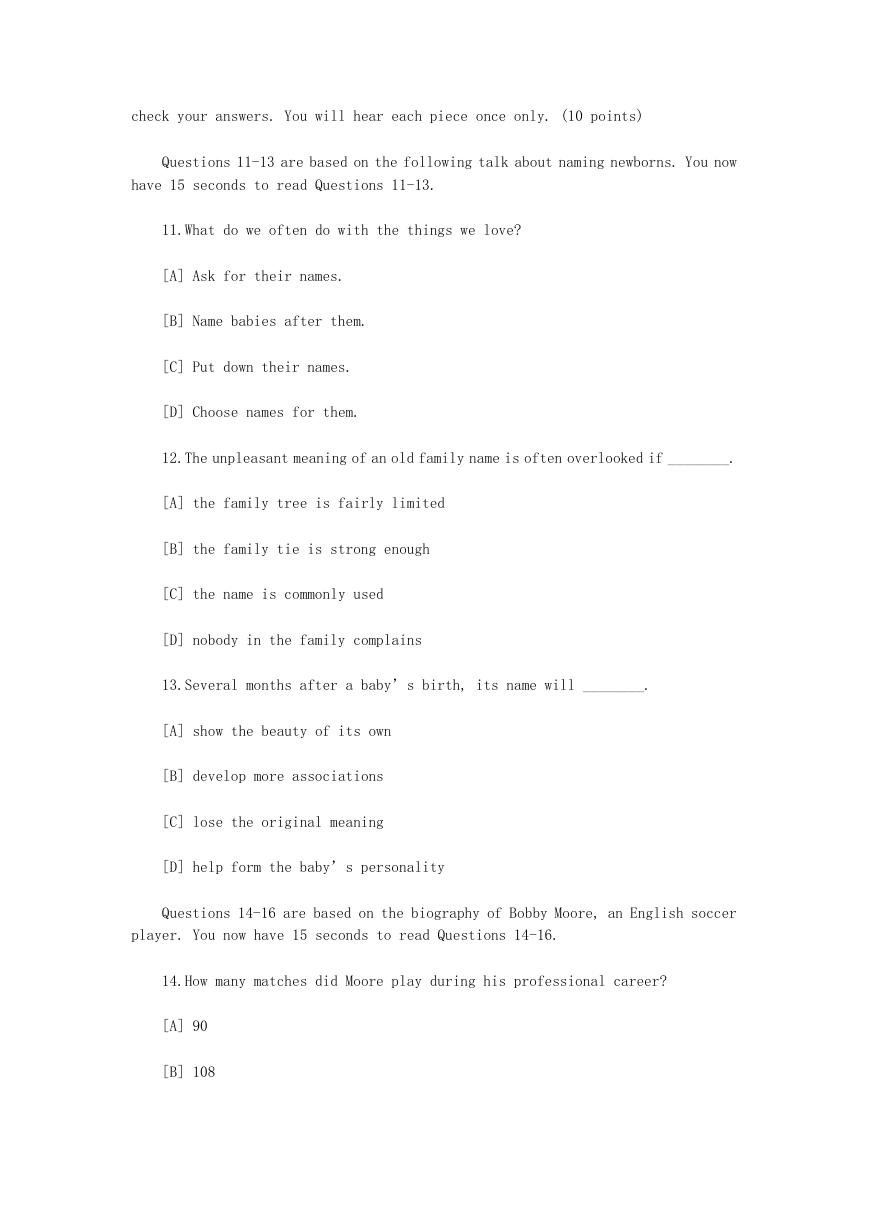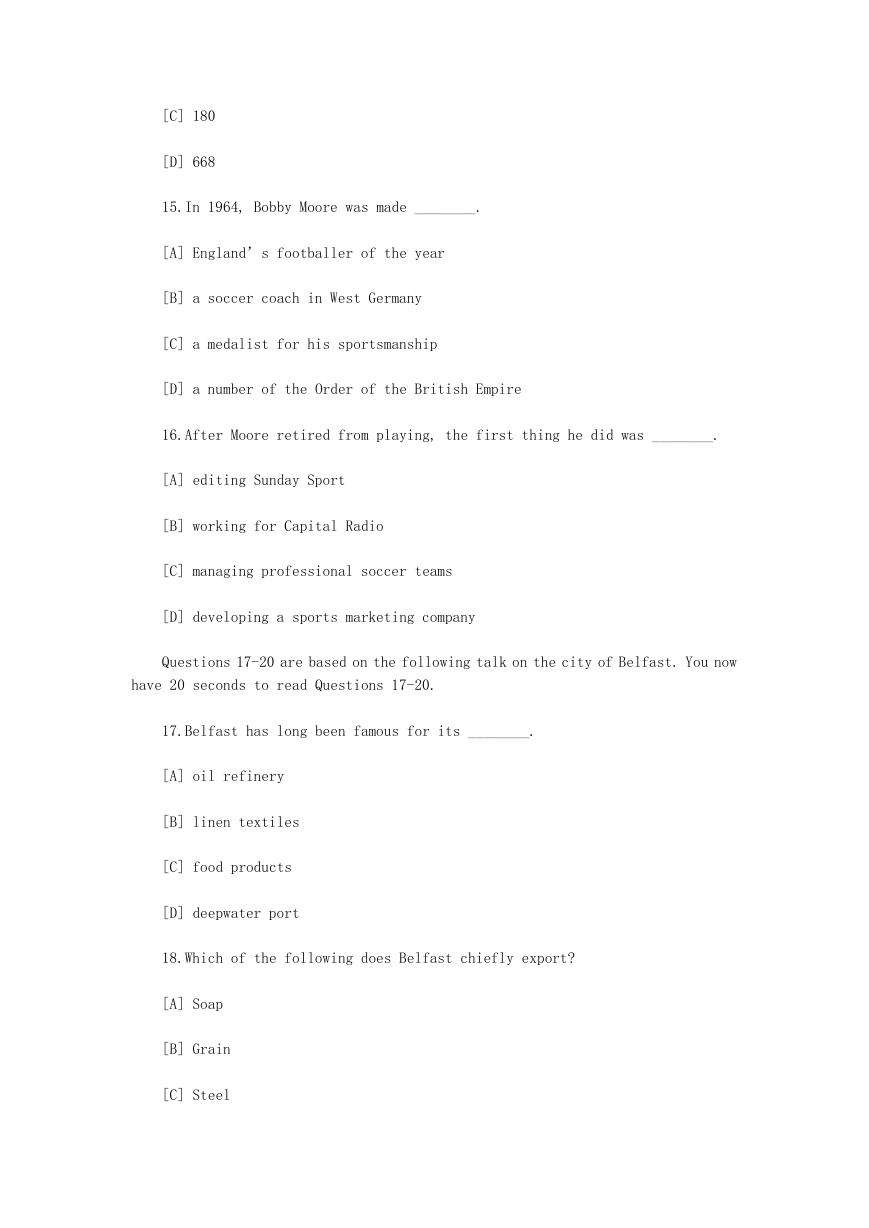2004 陕西考研英语一真题及答案
Section IListening Comprehension
Directions:
This section is designed to test your ability to understand spoken English. You
will hear a selection of recorded materials and you must answer the questions that
accompany them. There are three parts in this section, Part A, Part B and Part C.
Remember, while you are doing the test, you should first put down your answers
in your test booklet. At the end of the listening comprehension section, you will
have 5 minutes to transfer all your answers from your test booklet to ANSWER SHEET
1.
Now look at Part A in your test booklet.
Part A
Directions:
For questions 1-5, you will hear a talk about the geography of Belgium. While
you listen, fill out the table with the information you have heard. Some of the
information has been given to you in the table. Write only 1 word or number in each
numbered box. You will hear the recording twice. You now have 25 seconds to read
the table below. (5 points)
Geography of Belgium
Three main regions coastal plain
central plateau
highlands 1
Highest altitude of the coastal plain _______m 2
Climate near the sea Humid
Mild 3
Particularly rainy months of the years April
�
November 4
Average temperatures in July in Brussels low 13℃
high _______℃ 5
Part B
Directions:
For Questions 6-10, you will hear an interview with Mr. Saffo from the Institute
for the Future. While you listen, complete the sentences or answer the questions.
Use not more than 3 words for each answer. You will hear the recording twice. You
now have 25 seconds to read the sentences and questions below. (5 points)
What is Saffo according to himself?
The Institute for the Future provides services to private companies and
________.
The Institute believes that to think systematically about the long-range future
is________.
To succeed in anything, one should be flexible, curious and________.
What does Saffo consider to be essential to the work of a team?
6
7
8
9
10
Part C
Directions:
You will hear three pieces of recorded material. Before listening to each one,
you will have time to read the questions related to it. While listening, answer each
question by choosing [A], [B], [C] or [D]. After listening, you will have time to
�
check your answers. You will hear each piece once only. (10 points)
Questions 11-13 are based on the following talk about naming newborns. You now
have 15 seconds to read Questions 11-13.
11.What do we often do with the things we love?
[A] Ask for their names.
[B] Name babies after them.
[C] Put down their names.
[D] Choose names for them.
12.The unpleasant meaning of an old family name is often overlooked if ________.
[A] the family tree is fairly limited
[B] the family tie is strong enough
[C] the name is commonly used
[D] nobody in the family complains
13.Several months after a baby’s birth, its name will ________.
[A] show the beauty of its own
[B] develop more associations
[C] lose the original meaning
[D] help form the baby’s personality
Questions 14-16 are based on the biography of Bobby Moore, an English soccer
player. You now have 15 seconds to read Questions 14-16.
14.How many matches did Moore play during his professional career?
[A] 90
[B] 108
�
[C] 180
[D] 668
15.In 1964, Bobby Moore was made ________.
[A] England’s footballer of the year
[B] a soccer coach in West Germany
[C] a medalist for his sportsmanship
[D] a number of the Order of the British Empire
16.After Moore retired from playing, the first thing he did was ________.
[A] editing Sunday Sport
[B] working for Capital Radio
[C] managing professional soccer teams
[D] developing a sports marketing company
Questions 17-20 are based on the following talk on the city of Belfast. You now
have 20 seconds to read Questions 17-20.
17.Belfast has long been famous for its ________.
[A] oil refinery
[B] linen textiles
[C] food products
[D] deepwater port
18.Which of the following does Belfast chiefly export?
[A] Soap
[B] Grain
[C] Steel
�
[D] Tobacco
19.When was Belfast founded?
[A] In 1177
[B] In 1315
[C] In the 16th century
[D] In the 17th century
20.What happened in Belfast in the late 18th century?
[A] French refugees arrived.
[B] The harbor was destroyed.
[C] Shipbuilding began to flourish.
[D] The city was taken by the English.
You now have 5 minutes to transfer all your answers from your test booklet to
ANSWER SHEET 1.
Section II: Use of English
Directions:
Read the following text. Choose the best word (s) for each numbered blank and
mark [A], [B], [C] or [D] on ANSWER SHEET 1. (10 points)
Many theories concerning the causes of juvenile delinquency (crimes committed
by young people) focus either on the individual or on society as the major
contributing influence. Theories __21__ on the individual suggest that children
engage in criminal behavior __22__ they were not sufficiently penalized for previous
misdeeds or that they have learned criminal behavior through __23__ with others.
Theories focusing on the role of society suggest that children commit crimes in
__24__ to their failure to rise above their socioeconomic status, __25__ as a
rejection of middle-class values.
Most theories of juvenile delinquency have focused on children from
disadvantaged families, __26__ the fact that children from wealthy homes also commit
�
crimes. The latter may commit crimes __27__ lack of adequate parental control. All
theories, however, are tentative and are __28__ to criticism.
Changes in the social structure may indirectly __29__ juvenile crime rates. For
example, changes in the economy that __30__ to fewer job opportunities for youth
and rising unemployment __31__ make gainful employment increasingly difficult to
obtain. The resulting discontent may in __32__ lead more youths into criminal
behavior.
Families have also __33__ changes these years. More families consist of one
parent households or two working parents; __34__, children are likely to have less
supervision at home __35__ was common in the traditional family __36__. This lack
of parental supervision is thought to be an influence on juvenile crime rates. Other
__37__ causes of offensive acts include frustration or failure in school, the
increased __38__ of drugs and alcohol, and the growing __39__ of child abuse and
child neglect. All these conditions tend to increase the probability of a child
committing a criminal act, __40__ a direct causal relationship has not yet been
established.
21.[A] acting [B] relying [C] centering [D] cementing
22.[A] before [B] unless [C] until [D] because
23.[A] interactions [B] assimilation [C] cooperation [D] consultation
24.[A] return [B] reply [C] reference [D] response
25.[A] or [B] but rather [C] but [D] or else
26.[A] considering [B] ignoring [C] highlighting [D] discarding
27.[A] on [B] in [C] for [D] with
28.[A] immune [B] resistant [C] sensitive [D] subject
29.[A] affect [B] reduce [C] chock [D] reflect
30.[A] point [B] lead [C] come [D] amount
31.[A] in general [B] on average [C] by contrast [D] at length
32.[A] case [B] short [C] turn [D] essence
33.[A] survived [B] noticed [C] undertaken [D] experienced
�
34.[A] contrarily [B] consequently [C] similarly [D] simultaneously
35.[A] than [B] that [C] which [D] as
36.[A] system [B] structure [C] concept [D] heritage
37.[A] assessable [B] identifiable [C] negligible [D] incredible
38.[A] expense [B] restriction [C] allocation [D] availability
39.[A] incidence [B] awareness [C] exposure [D] popularity
40.[A] provided [B] since [C] although [D] supposing
Section III Reading Comprehension
Part A
Directions:
Read the following four texts. Answer the questions below each text by choosing
[A], [B], [C] or [D] Mark your answers on ANSWER SHEET 1. (40 points)
Text 1
Hunting for a job late last year, lawyer Gant Redmon stumbled across
CareerBuilder, a job database on the Internet. He searched it with no success but
was attracted by the site’s “personal search agent.” It’s an interactive feature
that lets visitors key in job criteria such as location, title, and salary, then
E-mails them when a matching position is posted in the database. Redmon chose the
keywords legal, intellectual property, and Washington, D.C. Three weeks later, he
got his first notification of an opening. “I struck gold,” says Redmon, who E-mailed
his resume to the employer and won a position as in-house counsel for a company.
With thousands of career-related sites on the Internet, finding promising
openings can be time-consuming and inefficient. Search agents reduce the need for
repeated visits to the databases. But although a search agent worked for Redmon,
career experts see drawbacks. Narrowing your criteria, for example, may work against
you: “Every time you answer a question you eliminate a possibility.” says one
expert.
For any job search, you should start with a narrow concept -- what you think
you want to do -- then broaden it. “None of these programs do that,” says another
�
expert. “There’s no career counseling implicit in all of this.” Instead, the best
strategy is to use the agent as a kind of tip service to keep abreast of jobs in
a particular database; when you get E-mail, consider it a reminder to check the
database again. “I would not rely on agents for finding everything that is added
to a database that might interest me,” says the author of a job-searching guide.
Some sites design their agents to tempt job hunters to return. When CareerSite’
s agent sends out messages to those who have signed up for its service, for example,
it includes only three potential jobs -- those it considers the best matches. There
may be more matches in the database; job hunters will have to visit the site again
to find them -- and they do. “On the day after we send our messages, we see a sharp
increase in our traffic, ” says Seth Peets, vice president of marketing for
CareerSite.
Even those who aren’t hunting for jobs may find search agents worthwhile. Some
use them to keep a close watch on the demand for their line of work or gather
information on compensation to arm themselves when negotiating for a raise. Although
happily employed, Redmon maintains his agent at CareerBuilder. “You always keep
your eyes open,” he says. Working with a personal search agent means having another
set of eyes looking out for you.
41.How did Redmon find his job?
[A] By searching openings in a job database.
[B] By posting a matching position in a database.
[C] By using a special service of a database.
[D] By E-mailing his resume to a database.
42.Which of the following can be a disadvantage of search agents?
[A] Lack of counseling.
[B] Limited number of visits.
[C] Lower efficiency.
[D] Fewer successful matches.
43.The expression “tip service” (Line 4, Paragraph 3) most probably means
________.
�
















 2023年江西萍乡中考道德与法治真题及答案.doc
2023年江西萍乡中考道德与法治真题及答案.doc 2012年重庆南川中考生物真题及答案.doc
2012年重庆南川中考生物真题及答案.doc 2013年江西师范大学地理学综合及文艺理论基础考研真题.doc
2013年江西师范大学地理学综合及文艺理论基础考研真题.doc 2020年四川甘孜小升初语文真题及答案I卷.doc
2020年四川甘孜小升初语文真题及答案I卷.doc 2020年注册岩土工程师专业基础考试真题及答案.doc
2020年注册岩土工程师专业基础考试真题及答案.doc 2023-2024学年福建省厦门市九年级上学期数学月考试题及答案.doc
2023-2024学年福建省厦门市九年级上学期数学月考试题及答案.doc 2021-2022学年辽宁省沈阳市大东区九年级上学期语文期末试题及答案.doc
2021-2022学年辽宁省沈阳市大东区九年级上学期语文期末试题及答案.doc 2022-2023学年北京东城区初三第一学期物理期末试卷及答案.doc
2022-2023学年北京东城区初三第一学期物理期末试卷及答案.doc 2018上半年江西教师资格初中地理学科知识与教学能力真题及答案.doc
2018上半年江西教师资格初中地理学科知识与教学能力真题及答案.doc 2012年河北国家公务员申论考试真题及答案-省级.doc
2012年河北国家公务员申论考试真题及答案-省级.doc 2020-2021学年江苏省扬州市江都区邵樊片九年级上学期数学第一次质量检测试题及答案.doc
2020-2021学年江苏省扬州市江都区邵樊片九年级上学期数学第一次质量检测试题及答案.doc 2022下半年黑龙江教师资格证中学综合素质真题及答案.doc
2022下半年黑龙江教师资格证中学综合素质真题及答案.doc